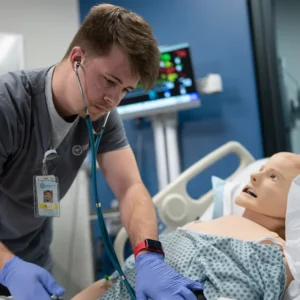HVAC–R Technician Career: Is it right for me?
You have the raw talent: hands-on skills, mechanical inclination and a natural curiosity about how things work. And when something doesn’t work, you have an instinct for figuring it out. A career as a Heating Ventilation Air Conditioning, & Refrigeration technician can be a strong match for you.
What are my on-the-job responsibilities?
Heating, air conditioning, and refrigeration mechanics and installers often called, HVAC–R technicians install, maintain and repair heating, cooling and refrigeration systems. HVAC-R technicians work on heating, ventilation, refrigeration and cooling systems that regulate and control the temperature, humidity and air quality in homes, businesses and other buildings. Job duties include:
- Inspect and test HVAC-R systems and components
- Install, clean and maintain HVAC-R systems
- Install electrical components and wiring
- Provide quality customer service and communication
- Repair or replace worn or defective parts
- Keep accurate records of work performed and time allocated
- Recommend services and ways to improve systems’ performance
- Collaborate with those providing related services
- Impact systems’ optimum operation and maintain industry standards
On a typical workday, HVAC-R technicians might inspect heating or cooling systems, clean ducts, replace filters or check and replace refrigerant levels, following government regulations for conservation, recovery and recycling of refrigerants. Repair and replacement of HVAC-R systems is a large part of what technicians do. Business owners and homeowners depend on climate control systems year-round and must keep them in good operating order. See: https://www.bls.gov/ooh/installation-maintenance-and-repair/heating-air-conditioning-and-refrigeration-mechanics-and-installers.htm#tab-6
What kind of work environment can I expect?
HVAC-R technicians work mostly indoors in homes, schools, hospitals, office buildings or factories and sometimes in small spaces where heating and cooling units are housed. Service calls may take technicians to several different locations. HVAC-R technicians may be part of a team on a large heating and cooling system installation project that might include electricians, sheet metal workers, plumbers and pipefitters. Thoughtful coordination and cooperation are essential to productive teamwork. There are opportunities for HVAC-R technicians to specialize in areas such as radiant heating systems, solar panels, testing and balancing, or commercial refrigeration.
Is job growth steady in this field?
According to the U.S. Bureau of Labor Statistics (BLS), Occupational Outlook Handbook, job growth for Heating, Air Conditioning, and Refrigeration mechanics and installers is projected to grow 13% from 2018 to 2028, much faster than the average for all occupations. This appears to be a popular career choice. In May 2018 there were approximately 6,220 HVACR technicians in the Phoenix-Mesa-Scottsdale area. See: https://www.bls.gov/ooh/installation-maintenance-and-repair/heating-air-conditioning-and-refrigeration-mechanics-and-installers.htm#tab-6 Three things currently drive the demand for well-trained Heating, Ventilation, Air Conditioning, and Refrigeration technicians: an increase in commercial and residential building construction, implementation of sophisticated climate-control systems and a growing emphasis on energy efficiency and pollution reduction that requires climate-control systems to be retrofitted, upgraded or replaced.
What kind of salary can I expect to earn?
The majority of HVAC-R technicians work full-time and have opportunities to supplement their earnings with overtime hours during peak heating and cooling seasons, if they choose. Evening and weekend shifts might provide an even higher wage than weekday schedules. The mean annual wage for HVAC-R mechanics and installers in the Phoenix-Mesa-Scottsdale, AZ area was $46,710 in May 2018, according to the Bureau of Labor statistics. Annual mean wages earned by the top 75%-90% were $55,340-$69,130. Statewide statistics noted top HVACR technicians earn up to $66,710 annually. See: https://www.bls.gov/oes/current/oes499021.htm#st
What is the best way to become a Heating, Ventilation, Air Conditioning & Refrigeration Technician?
Carrington College offers an accelerated HVAC-R program that prepares you to enter the field from a position of knowledge and experience that can quickly propel you forward in your new career. The HVAC-R program provides a balance of classroom instruction and hands-on experience in labs toward better understanding of fundamental concepts of operation, maintenance and repair of residential and commercial equipment and performance standards. Coursework prepares students to:
- Understand the theories of heating, refrigeration and air conditioning
- Become familiar with numerous systems that heat and cool buildings
- Understand the operation, maintenance and repair of residential and commercial equipment
- Calculate precise load requirements to heat or cool spaces properly
- Identify HVAC-R components and how they are correctly assembled and disassembled
- Troubleshoot problems with malfunctioning cooling systems and determine necessary repairs
- Work with refrigerants properly, safely and effectively; discard according to government standards
- Adopt effective time-management awareness and habits
- Maintain accurate records of work performed, materials used and time allocated
See: https://www.bls.gov/ooh/installation-maintenance-and-repair/heating-air-conditioning-and-refrigeration-mechanics-and-installers.htm#tab-6. Graduates of Carrington College’s Heating, Ventilation, Air Conditioning and Refrigeration program earn a Certificate of Achievement in as few as 10-months, or an Associate of Science Degree in as few as 15-months. An Enrollment Services Representative from Carrington College Phoenix TEC is always ready to give you more detailed information about the Heating, Ventilation, Air Conditioning and Refrigeration program and answer other questions you may have about career training and education in this field. When you are ready, we are here to help.



